|
|
|
Sort Order |
|
|
|
Items / Page
|
|
|
|
|
|
|
| Srl | Item |
| 1 |
ID:
185495
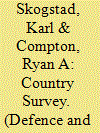

|
|
|
|
|
| Summary/Abstract |
This paper provides an overview of the Canadian defence sector following the Cold War. A review of Canadian defence policy in this period indicates that, though the mission of the Canadian military did not change, fiscal realities forced severe restrictions on the size and capabilities of the organization. Comparisons between Canada and other G7 NATO nations indicate that throughout this period, Canada has consistently devoted fewer resources to the military than its allies. A review of Canada’s defence industrial base and defence policy indicates that this limited funding has led to a small and uncompetitive defence sector in the Canadian economy. Lastly, a regression analysis of Canada’s defence spending is undertaken which reveals that domestic economic variables are the primary determinant of Canadian defence spending during this period.
|
|
|
|
|
|
|
|
|
|
|
|
|
|
|
|
| 2 |
ID:
185494
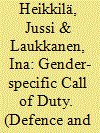

|
|
|
|
|
| Summary/Abstract |
We document that existing gender equality indices do not account for gender-specific mandatory peace-time conscription (compulsory military service). This suggests that gender-specific conscription is not considered to be an important gender issue. If an indicator measuring the gender equality of mandatory conscription was to be included in gender equality indices with appropriate weight, then the relative rankings of countries in terms of measured gender equality could be affected. In the context of the Nordic countries, this would mean that Finland and Denmark – the countries with mandatory conscription for men only – would have worse scores with respect to gender equality compared to Sweden and Norway, countries with conscription for both men and women – and Iceland, which has no mandatory conscription, regardless of gender.
|
|
|
|
|
|
|
|
|
|
|
|
|
|
|
|
| 3 |
ID:
185492


|
|
|
|
|
| Summary/Abstract |
All major research programs that study technological change find common ground in emphasizing the explanatory significance of domestic institutions in determining national innovation rates. And yet, after decades of research, this domestic-centered approach has yet to identify any particular set of institutions or policies that explain variation in innovative performance over time and across cases. Recently, a new research program has emerged which argues that this bottleneck to theory development is due to a critical omitted variable bias: international security. This article probes one facet of this argument by examining the relationship between international threat environments and national innovation rates. The regression results show a positive effect of threats on national innovation, a finding that is robust across different specifications and periods of analysis. Additionally, unlike previous studies that find no significant relationship between security alliances and military innovation, the opposite is true of threat: states faced with high external threat environments tend to innovate at the defense technology frontier.
|
|
|
|
|
|
|
|
|
|
|
|
|
|
|
|
| 4 |
ID:
185491
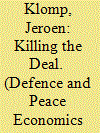

|
|
|
|
|
| Summary/Abstract |
On October 2nd, 2018, Jamal Khashoggi, a journalist and critic of the Saudi Arabian regime, disappeared after a visit to the Saudi Arabian consulate in Turkey nd was most likely murdered shortly afterwards. After this incident, a period of uncertainty started about whether or not a major arms deal that was signed between the United States and Saudi Arabia would still going to be approved by Congress or in turn will be rejected. The main findings presented in this study clearly demonstrate that the uncertainty surrounding the deal caused a significant drop in the daily return on the equity prices of US defense firms. This result suggests that investors believe that it is very likely that the major arms deal will be blocked by Congress in the short-run thereby reducing the business perspectives of the US defense-related industry. Besides these findings also imply that investors expect that the US president will not use its veto power or make permanently use of the exemption clause provided in the US arms trade legislation.
|
|
|
|
|
|
|
|
|
|
|
|
|
|
|
|
| 5 |
ID:
185490
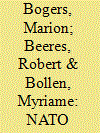

|
|
|
|
|
| Summary/Abstract |
This paper provides both a quantitative and a qualitative review and interpretation of 153 journal papers on NATO burden sharing behaviour published over the period 1966–2020. Based on our findings, we distinguish three paradigms, reflecting the main questions and views within their particular realm of burden sharing research. Subsequently, these three paradigms study (1) the distribution of defence burdens amongst NATO member states; (2) the determinants of NATO burden sharing behaviour; and (3) how contributions to the public good of individual member states merge to determine the overall level of the good available for consumption. For each paradigm, a qualitative insight in evolving bodies of literature is offered. As it turns out, most burden sharing studies are limited to one paradigm and its ensuing main question. Future research may benefit from cross-fertilization across paradigms, longitudinal approaches and a widening of empirical foci to encompass novel threats.
|
|
|
|
|
|
|
|
|
|
|
|
|
|
|
|
| 6 |
ID:
185489
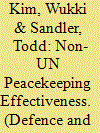

|
|
|
|
|
| Summary/Abstract |
This paper examines the effectiveness of non-UN-led peacekeeping operations (PKOs) from two alternative perspectives. First, the four kinds of regional and international (out of region) PKOs are investigated based on their ability to curtail one-sided violence (OSV) against civilians by host governments or rebels. That analysis is further bolstered by propensity-score matching to ameliorate potential selection bias stemming from non-UN PKOs. For the matched sample, we find that non-UN peacebuilding and peace enforcement missions limit rebel caused OSV, which is a novel result. Second, the ability of non-UN PKOs’ troops and police to end conflict or to maintain peace are ascertained based on survival analysis. Non-UN troops, but not police, curtail the transition from peace, regardless of matching. Generally, non-UN PKOs display effectiveness in limiting OSV or maintaining peace, but not in ending conflict.
|
|
|
|
|
|
|
|
|
|
|
|
|
|
|
|
| 7 |
ID:
185493


|
|
|
|
|
| Summary/Abstract |
We use a cross-country dataset on terrorism and leadership survival from 1970 through 2015 to shed light on a leader’s fate after terrorists’ strike. We provide robust evidence that incumbents in electoral authoritarian regimes face an increased hazard of exit from political power. This is contrasted with the closed authoritarian dictators that remain intact. Moreover, we fail to find a robust effect of terrorism on a leader’s survival probability in democracies. We conceive this effect to be due to the collapse of the elite coalition in autocracies after an attack, suggesting that the dictator’s ‘loyal friends’ betray him in the aftermath of terrorism.
|
|
|
|
|
|
|
|
|
|
|
|
|
|
|
|
|
|
|
|
|